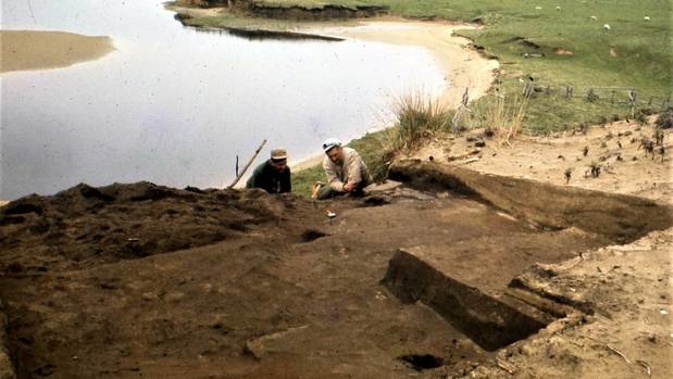
A Northland scientist has for the first time pinpointed the origin of early Māori artefacts found in New Zealand to a precise location in eastern Polynesia.
Dr Ross Ramsay's discovery further backs up oral history that Māori arrived in New Zealand not by accident but in a deliberate voyage of exploration that began in what is now French Polynesia.
Ramsay, a retired geologist living in Kerikeri, studied three scoria blocks found in archaeological sites at the bottom of the South Island and on a dune on Stewart Island. The sites also contained early Polynesian artefacts and moa remains.
Analysis of the blocks' chemical composition showed they were unlike any volcanic rocks found in New Zealand — but almost identical to a marae stone found on the island of Mehetia, about 100km southeast of Tahiti in French Polynesia, and brought back to Otago Museum in the 1930s.
/arc-anglerfish-syd-prod-nzme.s3.amazonaws.com/public/5JV4H42D6NDNVH2AEL6GW3GPTQ.jpg)
The blocks are typical of volcanic rocks found around Tahiti but the lack of weathering suggested the scoria was produced by recent volcanic activity. Mehetia is the only volcano to have erupted in that part of the Pacific in the past 1000 years.
Based on that evidence Ramsay believed the blocks were marae stones brought to New Zealand by early Polynesian settlers from their ancestral home in the ''Hawaiki zone'' and placed at different points of arrival in the southern South Island.
Intriguingly, Tahitian oral history tells of navigators stopping off at the sacred island of Mehetia before embarking on the long journey to New Zealand.
"The weight of scientific evidence and cultural knowledge highlights the fact that these rather lifeless, uninteresting-looking rocks ... are in fact an important ancestral link to Polynesia. That makes these scoria blocks some of the most significant artefacts associated with the voyaging heritage of Māori in New Zealand."
Ramsay did not know of any other pre-European artefact found in New Zealand which could be traced, with reasonable archaeological and scientific certainty, to an exact location.
/arc-anglerfish-syd-prod-nzme.s3.amazonaws.com/public/LNKZQJKB4FFW7ILCAYEY2H74XA.jpg)
Heritage New Zealand's Northland manager, Bill Edwards, is among those excited by Ramsay's discovery.
The stones' location at the bottom of the South Island suggested the people who left them may have sailed directly from Tahiti over 4000km of open water rather than island-hopping through the Tonga-Kermadec arc.
"If that's the case then we're talking about navigators with extraordinary ability. The fact that they left their homeland with scoria blocks is also an indicator that they fully expected to arrive at a destination," Edwards said.
Earlier this year, when Northland's Hekenukumai Busby was knighted for reviving traditional ocean voyaging and celestial navigation in Aotearoa, Te Rarawa leader Haami Piripi said Sir Hek's feats had dispelled the myth that Māori had arrived in New Zealand by accident and not by design.
Ramsay's finding was yet more evidence confirming Māori oral history, he said.
''We know linguistically, culturally, from genealogy and oral history that the Māori people originated from the Tahitian islands,'' he said.
Take your Radio, Podcasts and Music with you









